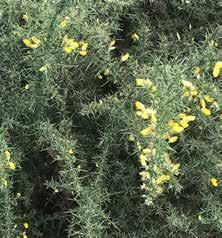
3 minute read
Pest Plant: gorse
By Grant McKechnie
There is a theory that if you shut New Zealand for 100 years or so, when you came back only native plants would exist. Without any help native flora would self-seed, flourish and ultimately dominate introduced species. It’s a theory I believe, mostly.
Advertisement
What has this got to do with gorse? Well, the hillside that we look out onto from our block was once covered in gorse. When we moved here the farmer would spray on a regular basis and keep it under control, then when the block was sold for development the spraying stopped and the gorse took off. In no time it was 2 to 3 metres tall. Over the next 5 years native plants started popping up through the gorse and by year 7, the only gorse you could see was on the outside edges. The rest of the hillside was dominated by tree ferns, manuka and kanuka with an understory of karamu mahoe and the like.
Now when you look at that hillside all you see are native plants, all self-sown with no intervention from humans. So, if that can happen so quickly, imagine what would happen over 100 years.
It helps of course that we have so much surrounding native vegetation providing a seed source, for birds to feed on and process and the wind to blow. But the gorse also played a role, one; by providing shelter for the young native seedlings who push themselves up through the gorse to get to the light, and two; gorse is a nitrogen fixing plant, it draws nitrogen from air and stores it in nodules on its roots. When the gorse dies because it is being smothered by the native plants this nitrogen is released into the soil feeding the surrounding plants further aiding their growth.
When I say I mostly believe in the 100-year theory, I think it might take a bit longer for the recovery to happen in the some parts of the South Island
Gorse: no longer prized as a hedge plant
where there is so few remnant forests left and the wilding trees are so vigorous.
So, how to get rid of your gorse, you know now that you could just do nothing which is very seldom an option with weeds. Otherwise it’s spraying with herbicides that contain either Metsulfuron-methyl, Triclopyr or a strong dose of Glyphosate will work, particularly if the gorse is small. Alternatively, cut it down and dab the stump within 10 minutes with a triple strength of any of these chemicals.
Gorse was introduced in the 1800s as a hedge/fence plant to keep stock in and also grown for firewood. In fact, if you were leasing crown land you were required to plant hedgerows and one of the recommended plants was gorse, produced by the local nursery. Imagine that! Actually, I did get asked a couple of times in the nursery for gorse plants. It quickly went from being not only sought after to also being cursed. Farmers were pleased with how quickly it grew for hedging purposes but not so pleased when it would pop up a metre away in the paddock, then it was a weed.
Gorse continued to be promoted as a good hedge plant well into the 1900s even though its invasive nature was well established by then.
Do your paddocks need mowing?
The recent rainfall in Coatesville followed by sunshine has caused a surge in growth for all plants, including pasture.
If the grass in your paddocks is long with grass seed heads forming, now's the time to book a tractor mow.
Warren Haigh of AOK mowing says that by cutting grass at this time of year, you remove the tough stalky content which is often difficult to mow with a rideon and encourage new grass to grow. "Mowing prevents the grass from becoming dry and stalky and gives you a lush, greener look for longer. It also saves it from becoming a fire hazard in dry summer conditions," says Warren.
With Christmas a little over a month away, AOK are now taking bookings for paddock and lifestyle block mowing. "Our new Kubota tractor and mower arrive next week so if you want your grass to look it's best for Christmas, call us today."
See the advertisement below for AOK's contact information.

● Mulcher Mowing ● Paddocks & Large Lawns Warren Haigh Phone: 0273 977 612 Email: AOK2019nz@gmail.com









